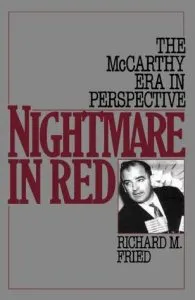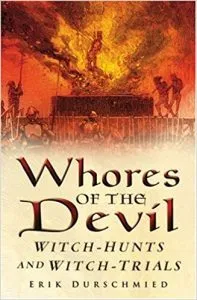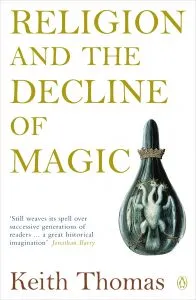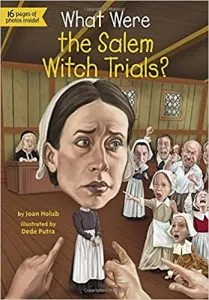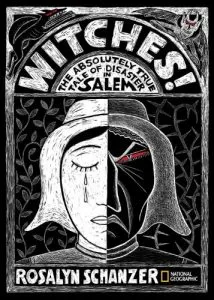
Books About Actual Witch Hunts for POTUS to Read
This content contains affiliate links. When you buy through these links, we may earn an affiliate commission.
You know how you learn a new word and you find a way to crowbar it into conversations?
Well, it seems that the commander-in-chief has recently learned the term “witch hunt”…and boy, does he love it!
 But it’s made obvious in his myriad tweets and rants that he’s not entirely clear on what a witch hunt is. I think we can help out a bit here.
Here is a list of books that will educate the man behind the Resolute desk on what constitutes a witch hunt, and what is merely the wheels of justice and democracy grinding away.
But it’s made obvious in his myriad tweets and rants that he’s not entirely clear on what a witch hunt is. I think we can help out a bit here.
Here is a list of books that will educate the man behind the Resolute desk on what constitutes a witch hunt, and what is merely the wheels of justice and democracy grinding away.
Pulitzer Prize winner Stacy Schiff, author of the #1 bestseller Cleopatra, provides an electrifying, fresh view of the Salem witch trials. The Witches is Schiff ‘s riveting account of a seminal episode, a primal American mystery unveiled-in crackling detail and lyrical prose-by one of our most acclaimed historians.
Richard Fried’s Nightmare in Red offers a riveting and comprehensive account of this crucial time. He traces the second Red Scare’s antecedents back to the 1930s, and presents an engaging narrative about the many different people who became involved in the drama of the anti-communist fervor, from the New Deal era and World War II, through the early years of the Cold War, to the peak of McCarthyism, and beyond McCarthy’s censure to the decline of the House Committee on Un-American Activities in the 1960s.
An exhaustive look at the persons and organizations who persecuted witches throughout modern history. Covering the Middle Ages up through modern times, this unique history explores the development of the “witch delusion” and uncovers the cruel butchers who hunted and executed so-called witches. It explores in-depth the various motivations—including self-protection, personal vindictiveness, public recognition, political aims, and sheer greed—behind those who condemned, tortured, and executed numerous innocent people.
The stark immediacy of what happened in 1692 has obscured the complex web of human passion which had been growing for more than a generation before building toward the climactic witch trials. Salem Possessed explores the lives of the men and women who helped spin that web and who in the end found themselves entangled in it.
Witchcraft, astrology, divination, and every kind of popular magic flourished in England during the 16th and 17th centuries, from the belief that a blessed amulet could prevent the assaults of the Devil to the use of the same charms to recover stolen goods. At the same time, the Protestant Reformation attempted to take the magic out of religion, and scientists were developing new explanations of the universe. Keith Thomas’s classic analysis of beliefs held on every level of English society begins with the collapse of the medieval Church and ends with the changing intellectual atmosphere around 1700, when science and rationalism began to challenge the older systems of belief.
Something wicked was brewing in the small town of Salem, Massachusetts in 1692. It started when two girls, Betty Parris and Abigail Williams, began having hysterical fits. Soon after, other local girls claimed they were being pricked with pins. With no scientific explanation available, the residents of Salem came to one conclusion: it was witchcraft. Over the next year and a half, nineteen people were convicted of witchcraft and hanged while more languished in prison as hysteria swept the colony. Author Joan Holub gives readers and inside look at this sinister chapter in history.
The riveting, true story of the victims, accused witches, crooked officials, and mass hysteria that turned a mysterious illness affecting two children into a witch hunt that took over a dozen people’s lives and ruined hundreds more unfolds in chilling, novelistic detail—complete with stylized black-white-and-red scratchboard illustrations of young girls having wild fits in the courtroom, witches flying overhead, and the Devil and his servants terrorizing the Puritans—in this young adult book by award-winning author and illustrator Rosalyn Schanzer.
Eh, who are we kidding? He doesn’t read. But you probably do…so check them out!
 But it’s made obvious in his myriad tweets and rants that he’s not entirely clear on what a witch hunt is. I think we can help out a bit here.
Here is a list of books that will educate the man behind the Resolute desk on what constitutes a witch hunt, and what is merely the wheels of justice and democracy grinding away.
But it’s made obvious in his myriad tweets and rants that he’s not entirely clear on what a witch hunt is. I think we can help out a bit here.
Here is a list of books that will educate the man behind the Resolute desk on what constitutes a witch hunt, and what is merely the wheels of justice and democracy grinding away.




